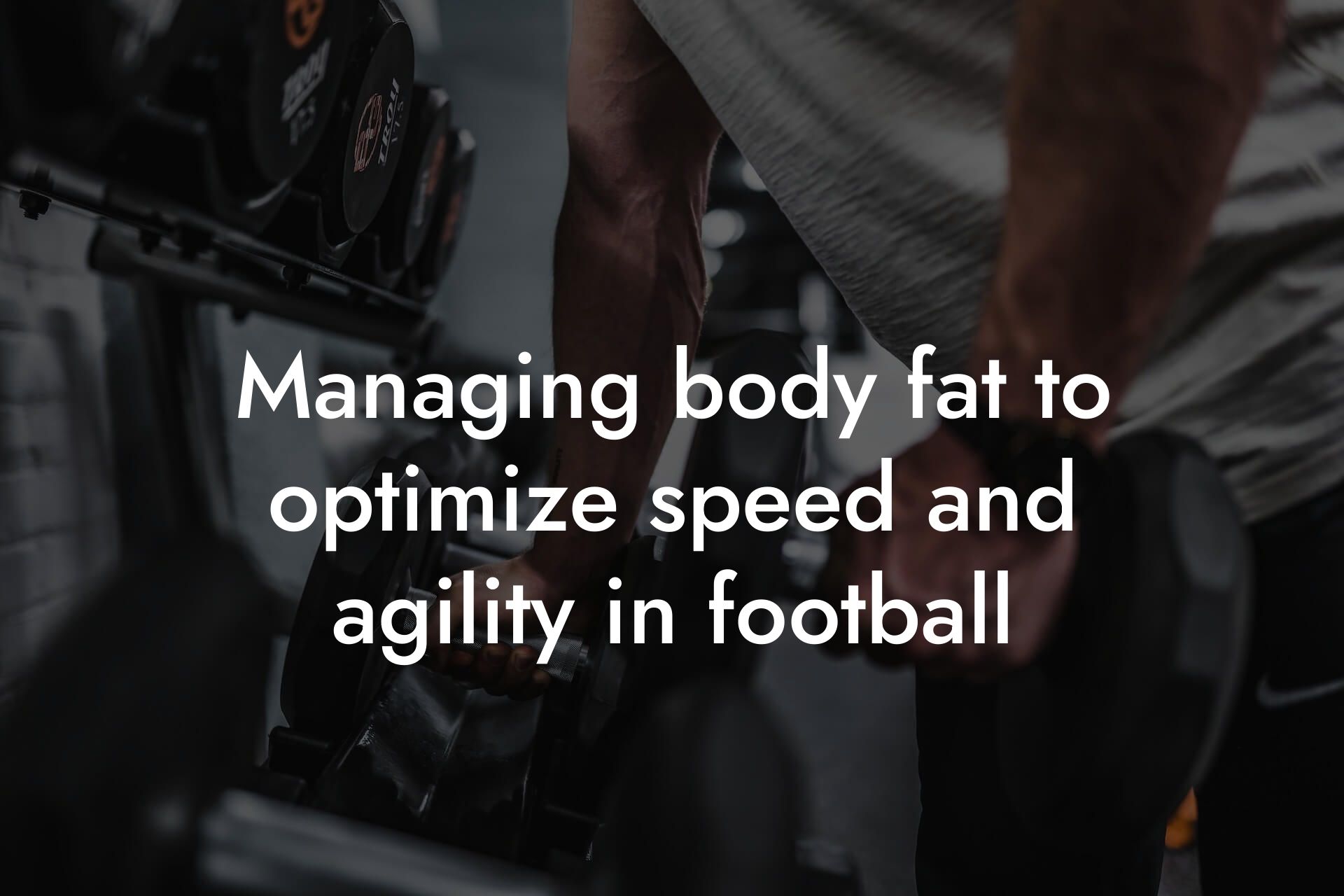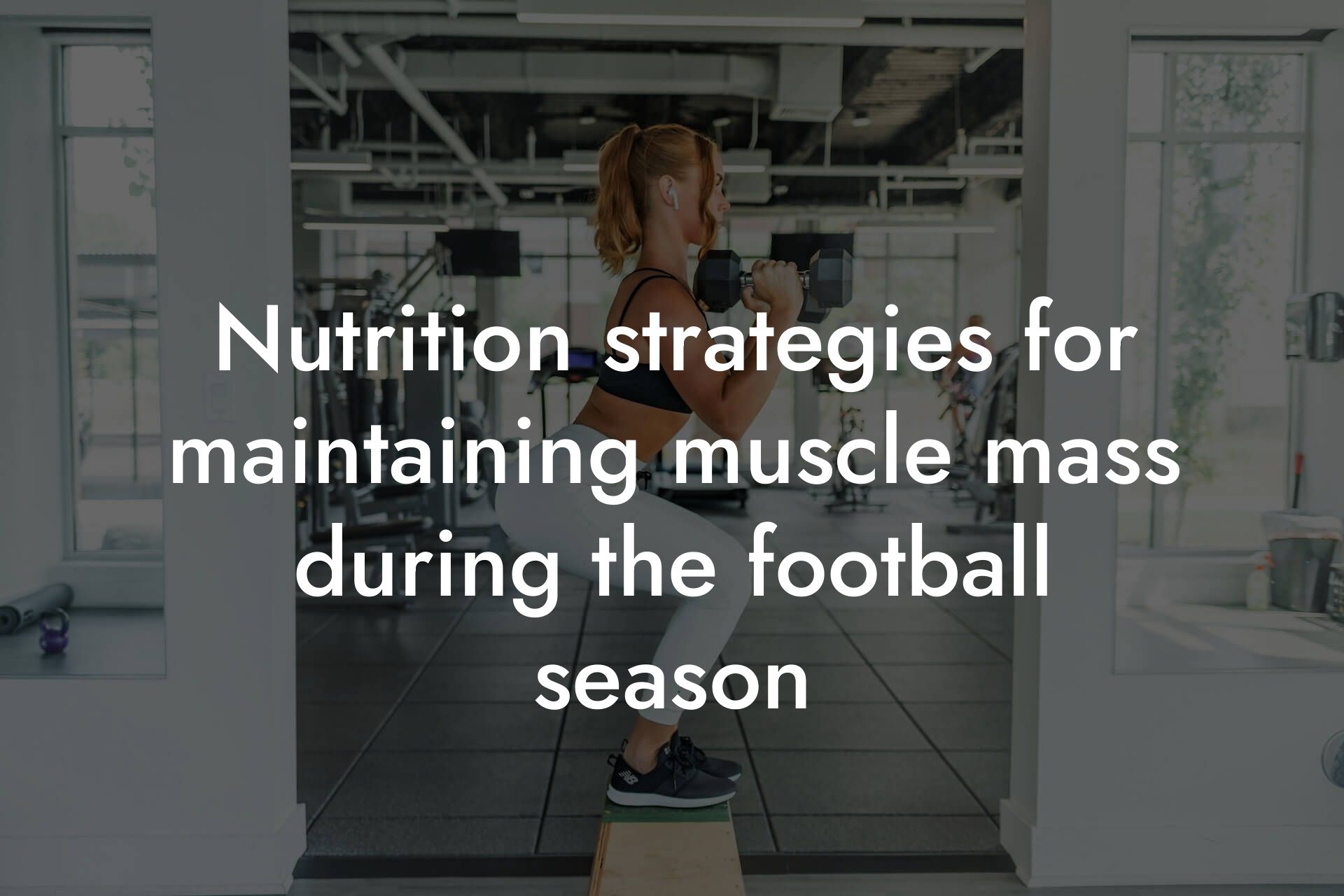As a high-earning professional, taking care of your physical appearance and overall health is crucial to maintaining peak performance in both your career and personal life. For football athletes, recovery strategies play a vital role in enhancing performance, reducing the risk of injury, and promoting overall well-being. At Tano Performance Group, we understand the importance of providing our clients with comprehensive information to help them achieve their fitness goals. In this article, we will delve into the essential recovery strategies for football athletes, focusing on nutrition and rest.
Table of Contents
Why Recovery is Crucial for Football Athletes
Football is a high-intensity sport that demands a tremendous amount of physical effort, strength, and endurance. During a game or training session, football athletes experience micro-tears in their muscles, inflammation, and oxidative stress. If not properly addressed, these physiological responses can lead to fatigue, decreased performance, and increased risk of injury. Adequate recovery strategies help to repair and rebuild damaged tissues, replenish energy stores, and restore homeostasis, allowing athletes to perform at their best.
Nutrition for Recovery
Nutrition plays a critical role in the recovery process, providing the necessary building blocks for repair and growth. A well-planned diet can help football athletes to replenish energy stores, reduce muscle soreness, and support immune function. The following nutrients are essential for recovery:
- Protein: Consuming 15-20 grams of protein within 30-60 minutes after exercise helps to stimulate muscle protein synthesis, promoting muscle repair and growth.
- Carbohydrates: Replenishing glycogen stores with complex carbohydrates, such as whole grains, fruits, and vegetables, helps to restore energy levels and support muscle function.
- Healthy Fats: Omega-3 fatty acids, found in fatty fish, nuts, and seeds, help to reduce inflammation and promote recovery.
- Electrolytes: Replenishing electrolytes, such as sodium, potassium, and magnesium, helps to regulate fluid balance and nerve function.
- Antioxidants: Consuming antioxidant-rich foods, such as berries, leafy greens, and other fruits and vegetables, helps to reduce oxidative stress and inflammation.
Post-Exercise Nutrition
The post-exercise window is a critical period for nutrition, as it sets the stage for optimal recovery. Football athletes should aim to consume a balanced meal or snack that includes protein, carbohydrates, and healthy fats within 30-60 minutes after exercise. Examples of post-exercise snacks include:
- Banana with almond butter and honey
- Greek yogurt with berries and nuts
- Smoothie with protein powder, frozen fruit, and almond milk
- Turkey and avocado wrap with mixed greens
Hydration for Recovery
Adequate hydration is essential for recovery, as it helps to regulate body temperature, transport nutrients, and remove waste products. Football athletes should aim to consume at least 8-10 glasses of water per day, with an additional 16-20 ounces of water for every pound of body weight lost during exercise.
Rest and Sleep for Recovery
Rest and sleep are critical components of the recovery process, allowing the body to repair and adapt to the physical demands of football. During sleep, the body repairs and rebuilds damaged tissues, consolidates memories, and regulates hormones. Football athletes should aim for 7-9 hours of sleep each night, establishing a consistent sleep schedule to optimize recovery.
Active Recovery Techniques
Active recovery techniques, such as light cardio, stretching, and foam rolling, can help to promote blood flow, reduce muscle soreness, and enhance recovery. Examples of active recovery techniques include:
- Light jogging or cycling
- Static stretching, focusing on major muscle groups
- Foam rolling, targeting areas of high muscle tension
- Self-myofascial release, using tools such as lacrosse balls or tennis balls
Compression Garments and Recovery
Compression garments, such as tights and sleeves, have gained popularity among athletes, claiming to enhance recovery by improving blood flow and reducing muscle soreness. While the scientific evidence is limited, compression garments may provide a psychological benefit, enhancing athlete confidence and perceived recovery.
In conclusion, recovery strategies play a vital role in enhancing performance, reducing the risk of injury, and promoting overall well-being for football athletes. By prioritizing nutrition, hydration, rest, and sleep, football athletes can optimize their recovery and achieve peak performance. At Tano Performance Group, we understand the importance of providing our clients with comprehensive information to help them achieve their fitness goals. By incorporating these recovery strategies into their training regimen, football athletes can take their performance to the next level.
If you're interested in learning more about how to optimize your recovery and improve your overall physical performance, consider scheduling a DEXA scan with Tano Performance Group. Our state-of-the-art technology provides a comprehensive body assessment, giving you the information you need to take your fitness to the next level.
Frequently Asked Questions
What is the importance of recovery strategies for football athletes?
Recovery strategies are crucial for football athletes as they help to repair and rebuild muscles, replenish energy stores, and reduce muscle soreness and fatigue. Adequate recovery enables athletes to perform at their best, reduces the risk of injury, and supports long-term athletic development.
Why is nutrition important for recovery in football athletes?
Nutrition plays a vital role in recovery as it provides the necessary building blocks for muscle repair and growth. A well-planned diet that includes adequate protein, complex carbohydrates, and healthy fats helps to replenish energy stores, support muscle function, and promote overall health.
What are the key nutrients for recovery in football athletes?
The key nutrients for recovery in football athletes include protein, complex carbohydrates, healthy fats, vitamins, and minerals. These nutrients help to repair and rebuild muscles, replenish energy stores, and support immune function.
How much protein do football athletes need for recovery?
Football athletes require 1.2-1.6 grams of protein per kilogram of body weight daily to support muscle repair and growth. This can be achieved through a combination of whole foods and supplements.
What is the role of carbohydrates in recovery for football athletes?
Carbohydrates are an essential source of energy for football athletes. They help to replenish energy stores, support muscle function, and promote recovery. Football athletes require 2-3 grams of carbohydrates per kilogram of body weight daily.
Why are healthy fats important for recovery in football athletes?
Healthy fats, such as omega-3 fatty acids, are important for recovery as they help to reduce inflammation, support immune function, and promote overall health. They can be found in foods such as nuts, seeds, avocados, and fatty fish.
What is the importance of hydration in recovery for football athletes?
Hydration is critical for recovery as it helps to replenish lost fluids, electrolytes, and minerals. Adequate hydration supports muscle function, reduces muscle soreness, and promotes overall health. Football athletes should aim to drink at least 8-10 glasses of water per day.
How much rest do football athletes need for recovery?
Football athletes require 1-2 rest days per week, depending on the intensity and frequency of training. Adequate rest allows for physical and mental recovery, reduces the risk of injury, and supports long-term athletic development.
What are the benefits of active recovery for football athletes?
Active recovery, such as light cardio or stretching, helps to promote blood flow, reduce muscle soreness, and support recovery. It can be performed at a low intensity and is an effective way to aid in the recovery process.
How can football athletes incorporate rest and recovery into their training program?
Football athletes can incorporate rest and recovery into their training program by scheduling rest days, incorporating active recovery techniques, and prioritizing sleep and nutrition. A well-planned training program should include a balance of training, rest, and recovery.
What are the consequences of inadequate recovery for football athletes?
Inadequate recovery can lead to fatigue, decreased performance, increased risk of injury, and burnout. It can also negatively impact mental health, mood, and overall well-being.
How can football athletes monitor their recovery?
Football athletes can monitor their recovery by tracking their sleep quality, heart rate variability, and subjective measures of fatigue and soreness. They can also use wearable technology, such as GPS trackers and heart rate monitors, to track their physical activity and recovery.
What are the benefits of periodized training for football athletes?
Periodized training involves alternating periods of intense training with periods of rest and recovery. This approach helps to reduce the risk of overtraining, promotes long-term athletic development, and supports peak performance.
How can football athletes prioritize sleep for recovery?
Football athletes can prioritize sleep by establishing a consistent sleep schedule, creating a sleep-conducive environment, and avoiding stimulating activities before bedtime. Aim for 7-9 hours of sleep per night to support recovery.
What are the benefits of compression garments for recovery in football athletes?
Compression garments, such as tights and sleeves, can help to improve blood flow, reduce muscle soreness, and support recovery. They can be worn during and after exercise to aid in the recovery process.
How can football athletes incorporate foam rolling and self-myofascial release into their recovery routine?
Foam rolling and self-myofascial release can help to reduce muscle soreness, improve range of motion, and support recovery. Football athletes can incorporate these techniques into their daily routine, focusing on areas such as the legs, glutes, and lower back.
What are the benefits of contrast showers for recovery in football athletes?
Contrast showers, which involve alternating between hot and cold water, can help to reduce muscle soreness, improve circulation, and support recovery. They can be performed after exercise to aid in the recovery process.
How can football athletes incorporate stretching and mobility exercises into their recovery routine?
Stretching and mobility exercises can help to improve range of motion, reduce muscle soreness, and support recovery. Football athletes can incorporate these exercises into their daily routine, focusing on areas such as the hamstrings, quadriceps, and hip flexors.
What are the benefits of nutrition supplements for recovery in football athletes?
Nutrition supplements, such as protein powder and creatine, can help to support muscle repair and growth, replenish energy stores, and promote recovery. However, they should be used in conjunction with a well-planned diet and training program.
How can football athletes stay motivated and focused during the recovery process?
Football athletes can stay motivated and focused during the recovery process by setting goals, tracking progress, and celebrating small victories. They can also surround themselves with a supportive network of coaches, teammates, and family members.
What are the benefits of mental recovery techniques for football athletes?
Mental recovery techniques, such as meditation and visualization, can help to reduce stress, improve focus, and promote recovery. They can be performed daily to aid in the recovery process and support overall well-being.
How can football athletes incorporate recovery strategies into their daily routine?
Football athletes can incorporate recovery strategies into their daily routine by prioritizing sleep, nutrition, and rest, and incorporating active recovery techniques, such as stretching and foam rolling. They can also schedule rest days and prioritize mental recovery techniques.
What are the benefits of working with a sports dietitian or nutritionist for recovery?
Working with a sports dietitian or nutritionist can help football athletes develop a personalized nutrition plan that supports recovery, improves performance, and promotes overall health. They can provide guidance on nutrition strategies, supplement use, and meal planning.
How can football athletes stay accountable and committed to their recovery plan?
Football athletes can stay accountable and committed to their recovery plan by setting goals, tracking progress, and sharing their plan with a coach, teammate, or mentor. They can also celebrate small victories and reward themselves for staying committed to their plan.
Here are some related articles you might love...
- The role of bone density in preventing football injuries
- Managing body fat to optimize speed and agility in football
- Nutrition strategies for maintaining muscle mass during the football season
- Balancing mass and speed: A guide for football athletes
- How DEXA scans can benefit professional football players
- How to maintain peak performance during the football season
- The importance of body composition in football performance
- Strength training tips for football players
- Off-season fitness programs for football players
Zak Faulkner
Zak Faulkner is a leading authority in the realm of physical health and body composition analysis, with over 15 years of experience helping professionals optimise their fitness and well-being. As one the experts behind Tano Performance Group, Zak has dedicated his career to providing in-depth, science-backed insights that empower clients to elevate their physical performance and overall health.
With extensive knowledge of DEXA technology, Zak specializes in delivering comprehensive body assessments that offer precise data on body fat, muscle mass, bone density, and overall physique. His expertise enables individuals to make informed decisions and achieve their fitness goals with accuracy and confidence. Zak’s approach is rooted in a deep understanding of human physiology, combined with a passion for helping clients unlock their full potential through personalised strategies.
Over the years, Zak has earned a reputation for his commitment to excellence, precision, and client-focused service. His guidance is trusted by top professionals who demand the best when it comes to their health. Whether advising on fitness programs, nutritional strategies, or long-term wellness plans, Zak Faulkner’s insights are a valuable resource for anyone serious about taking their health and fitness to the next level.
At Tano Performance Group, Zak continues to lead our Content Team revolutionising how professionals approach their physical health, offering unparalleled expertise that drives real results.




